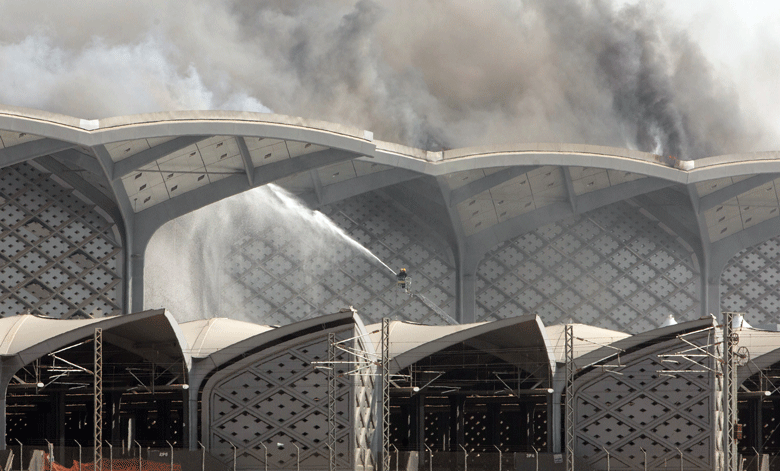

One of the five stations of Saudi Arabia’s first high-speed railway, which began commercial operations a year ago, caught fire on 29 September. According to local media reports, the incident left at least 10 people injured.
Video clips of the fire on social media showed dark smoke billowing out of the roof of the Haramain high-speed railway train station in Jeddah.
Helicopters equipped with water tankers were seen helping to put out the blaze.
MEED understands the fire erupted at 12.35pm on 29 September on the roof of the fourth floor of the station building.
Investigations are ongoing as to what caused the fire, with a final report yet to be released.
Brief history
The $13bn Haramain high-speed railway linking Mecca and Medina entered partial commercial operation in October last year. It served pilgrims during this year’s hajj season for the first time.
The scheme is the Gulf region’s first high-speed rail service with trains capable of running up to 300 kilometres an hour (kph). The 35 trains on the 450-kilometre rail line are expected to carry 60 million passengers a year once it enters full operations.
Construction of the railway began in 2009. The project comprises two phases, the first of which was awarded in two packages: one for the civil works and the other covering the construction of stations.
The Al-Rajhi Alliance consortium won the $2.9bn civil works contract in 2009. Led by the local Al-Rajhi Construction, the consortium includes the local Mada Group, Saud Consult, Masco and Al-Arrab Contracting Company; France’s Alstom Transport; the UK’s Eurostar and Arup; and China Railway Engineering Corporation.
In 2011, the second package, covering the construction of four stations in Mecca, Medina, Jeddah and King Abdullah Economic City (KAEC), was awarded to two consortiums led by Saudi Binladin Group and Saudi Oger.
Saudi Binladin Group, in joint venture with Turkey’s Yapi Merkezi, won the $1.29bncontract to build passenger stations at Mecca and Medina, while a team comprising Saudi Oger and El-Seif Engineering won the $1.27bn contract to build the stations at Jeddah and KAEC. However, in 2017, the client terminated the contract with Saudi Oger and they were replaced by Yapi Merkezi.
A joint venture of the UK’s Fosters + Partners and Buro Happold was awarded a SR142m contract to design the stations.
Phase 2, which covers a 450km route, comprises the construction of the railway tracks, installation of signalling and telecoms systems, electrification, construction of the operational control centre, the procurement of 35 trains, and the operation and maintenance of the railway for 12 years.
Spanish/local consortium Al-Shoula Group won the $8.2bn contract for phase 2 of the project in 2011.
Spanish companies that are part of the Al-Shoula consortium include:
- Adif / Renfe: 12-year operation and maintenance
- OHL / Copasa / Imathia: track construction and maintenance
- Inabensa / Cobra: electrification and electro-mechanical equipment
- Talgo: rolling stock
- Dimetronic (recently acquired by Siemens): signalling
- Indra: ancillary and control systems including intrusion detection and ticketing
The scheme has five stations in total. In addition to the terminals in Mecca, Medina, Jeddah and KAEC, a fifth station was built at King Abdulaziz International airport.
MEED understands six electricity feeder stations have been also constructed along the route to provide the required power to run the high-speed train. The project’s civil and earthworks comprises the construction of 130 bridges and 850 water channels.
You might also like...

Rainmaking in the world economy
19 April 2024

Oman receives Madha industrial city tender prices
19 April 2024

Neom seeks to raise funds in $1.3bn sukuk sale
19 April 2024

Saudi firm advances Neutral Zone real estate plans
19 April 2024
A MEED Subscription...
Subscribe or upgrade your current MEED.com package to support your strategic planning with the MENA region’s best source of business information. Proceed to our online shop below to find out more about the features in each package.





